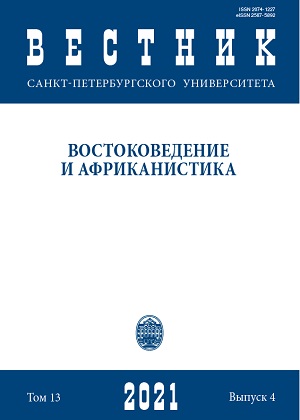Models of Nomenclature Clichés for the Translation of Bus Stop Names
DOI:
https://doi.org/10.21638/spbu13.2021.408Abstract
The preservation and expansion of the functioning sphere of the national languages of Russia is a requirement of modern times. Translation plays an important role in this, while, due to systemic discrepancies, literary and customary norms of the language occupy a dominant role. Translation is highly developed in the Republic of Sakha (Yakutia), works of oral folk art, fiction, some texts of the official business style are being translated, and the theoretical foundations of translation are being developed. Nevertheless, microtoponyms as an object of study of the private theory of Russian-Yakut translation have not been sufficiently studied, which determined the aim of the current study — the analysis of the phonetic, lexical and grammatical features of the models for creating nomenclature clichés in the modern Yakut language based on the materials of the translation of bus stops into the Yakut language. The work is an attempt, for the first time, to consider models for translating microtoponyms, in particular, the names of bus stops. The subject of the study was deliberately chosen: when sound accompaniment in the Yakut language was introduced in the capital’s transport routes, the public was outraged at the quality of the translation of the names of bus stops, which determined its editing. The material is the second translation, made by staff at the Institute of Humanities and Social Sciences of the Siberian Branch of the Russian Academy of Sciences, edited by teachers of the department of stylistics of the Yakut language and Russian-Yakut translation of the NEFU named after M. K. Ammosov. The methods of continuous sampling, comparative and descriptive methods were used. The names of bus stops reflect important information about the history and culture of the locality. The stops in Yakutsk are named according to the objects in close proximity to the stops: territorial zones, streets, less often historical events and dates. The analysis has shown that the translation of bus stops names is primarily aimed at an easy perception by the recipient. Phonetic methods of translation are present: transliteration and transcription in combination with equivalent substitution, addition, amplification; lexical ones are represented by equivalent and adequate substitutions, tracing, concretization, generalization, addition, amplification and explication; grammatical — by permutation and replacement.
Keywords:
models, translation, microtoponyms, national languages of the Russian Federation, language norms
Downloads
References
Downloads
Published
How to Cite
Issue
Section
License
Articles of "Vestnik of Saint Petersburg University. Asian and African Studies" are open access distributed under the terms of the License Agreement with Saint Petersburg State University, which permits to the authors unrestricted distribution and self-archiving free of charge.





